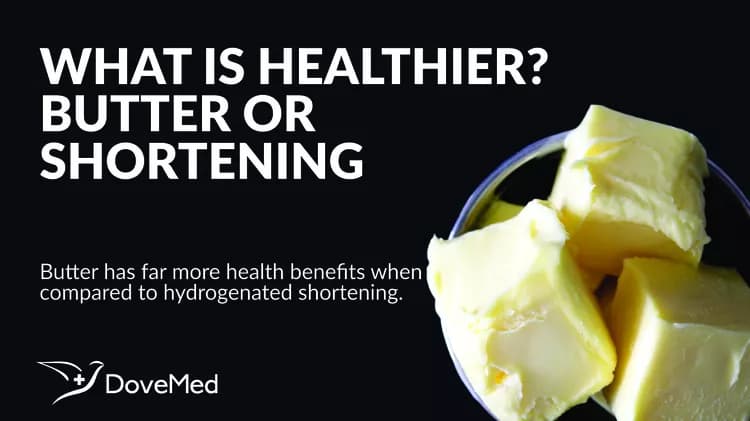Butter and shortening are called solid fats because they are solids at room temperature. Solid fats may be made from both animal and plant oils. The plant oils are hydrogenated to form ‘shortening’ that becomes solid at room temperature. These have high content of saturated and trans fat, making it unsuitable for consumption. Therefore, a very minimal level is recommended.
Benefits of shortening:
Shortening contains trans fat that is harmful for one’s health. It increases LDL cholesterol into the bloodstream, which is harmful; this can create conditions of inflammation resulting in heart attacks, diabetes, and other life-threatening conditions. Research from the Harvard School of Public Health concludes that trans fat is harmful, and even quantities that cause only 2% of calorie intake increase can heighten the risk of heart disease by up to 23%. There are no noted health benefits of shortening and as such, it is unfit for consumption, says an expert panel from the USDA Institute of Medicine. The term shortening is used for the edible substance that can be crumbled. It is an edible fat made from a vegetable or animal base and is used to make baked products soft and short. Some shortening are solids at room temperature and require high melting points. Bakers appreciate the hardness of the shortening. It is used to enhance the eating quality, increase the volume, and also to allow the cake to be fresh for longer periods of time. Shortening is colorless and hence, more suitable for cakes, as it does not change the coloring of the cake. It also has a neutral flavor that does not alter the natural flavor of the cake.
Benefits of butter:
The nomads of Central Asia are thought to have discovered butter. Research proves that butter is a healthy food. Dr. Weston Price who studied native diets in 1930s inferred that butter was the staple food for many healthy tribes. Butter contains nutrients and can help protect us from many diseases such as heart disease. Vitamin A in butter aids in the secretion of thyroid and adrenal gland hormones. These two glands play a vital role in improving cardiovascular functions. Infants that suffer from abnormalities of the heart due to vitamin A deficiency can be countered by using butter. Lecithin in butter improves assimilation and metabolism of cholesterol. There are antioxidants present in butter that can protect from free radical damage and weakening of the arteries. It is also a rich source of selenium, an antioxidant.
The Medical Research Council has proven that men consuming butter stand a lesser chance of developing heart disease, as against those consuming margarine. Butter has strong anti-cancer properties. It is also rich in short and medium chain fatty acids that can protect from tumor growth. It contains linoleic acid that can help protect the body from cancer. Vitamin A in butter also enhances the immune system. According to Dutch researcher Wulzen, butter protects against joint degenerative arthritis and calcification of the joints. It also defends from cataracts, calcification of the pineal glands, and hardening of the arteries. Vitamin D absorbs calcium and protects from osteoporosis.
In conclusion, butter has far more health benefits when compared to hydrogenated shortening.
References:
Price, Weston, DDS Nutrition and Physical Degeneration, 1945, Price Pottenger Nutrition Foundation, Inc., La Mesa, California
Cranton, EM, MD and JP Frackelton, MD, Journal of Holistic Medicine, Spring/Summer 1984
Nutrition Week Mar 22, 1991 21:12:2-3
Enig, Mary G, PhD, Nutrition Quarterly, 1993 Vol 17, No 4 Cohen, L A et al, J Natl Cancer Inst 1986 77:43
Belury, MA Nutrition Reviews, April 1995 53:(4) 83-89 Cohen, op cit American Journal of Physical Medicine, 1941, 133; Physiological Zoology, 1935 8:457
Kabara, J J, The Pharmacological Effects of Lipids, J J Kabara, ed, The American Oil Chemists Society, Champaign, IL 1978 pp 1-14
Jennings, IW Vitamins in Endocrine Metabolism, Charles C. Thomas Publisher, Springfield, Ill, pp 41-57
http://www.westonaprice.org/health-topics/why-butter-is-better/ (accessed on 14.02.2015)
http://www.health.harvard.edu/staying-healthy/the-truth-about-fats-bad-and-good (accessed on 14.02.2015)
http://www.nlm.nih.gov/medlineplus/ency/patientinstructions/000095.htm (accessed on 14.02.2015)
http://www.foodtimeline.org/shortening.html (accessed on 14.02.2015)
Helpful Peer-Reviewed Medical Articles:
Chang, H. S., & Kinnucan, H. W. (1991). Advertising, information, and product quality: the case of butter. American Journal of Agricultural Economics, 73(4), 1195-1203.
Lichtenstein, A. H., Erkkilä, A. T., Lamarche, B., Schwab, U. S., Jalbert, S. M., & Ausman, L. M. (2003). Influence of hydrogenated fat and butter on CVD risk factors: remnant-like particles, glucose and insulin, blood pressure and C-reactive protein. Atherosclerosis, 171(1), 97-107.
Related Articles
Test Your Knowledge
Asked by users
Related Centers
Related Specialties
Related Physicians
Related Procedures
Related Resources
Join DoveHubs
and connect with fellow professionals


0 Comments
Please log in to post a comment.